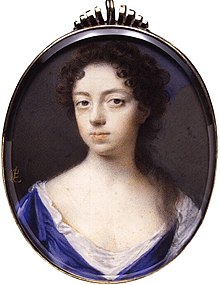A Pastoral Dialogue Between Two Shepherdesses
Anne Kingsmill Finch 1661 – 1720 (Westminster)
[Silvia] Pretty Nymph! within this Shade,
Whilst the Flocks to rest are laid,
Whilst the World dissolves in Heat,
Take this cool, and flow'ry Seat:
And with pleasing Talk awhile
Let us two the Time beguile;
Tho' thou here no Shepherd see,
To encline his humble Knee,
Or with melancholy Lays
Sing thy dangerous Beauty's Praise.
[Dorinda] Nymph! with thee I here wou'd stay,
But have heard, that on this Day,
Near those Beeches, scarce in view,
All the Swains some Mirth pursue:
To whose meeting now I haste.
Solitude do's Life but waste.
[Silvia] Prithee, but a Moment stay.
[Dorinda] No! my Chaplet wou'd decay;
Ev'ry drooping Flow'r wou'd mourn,
And wrong the Face, they shou'd adorn.
[Silvia] I can tell thee, tho' so Fair,
And dress'd with all that rural Care,
Most of the admiring Swains
Will be absent from the Plains.
Gay Sylvander in the Dance
Meeting with a shrew'd Mischance,
To his Cabin's now confin'd
By Mopsus, who the Strain did bind:
Damon through the Woods do's stray,
Where his Kids have lost their way:
Young Narcissus iv'ry Brow
Rac'd by a malicious Bough,
Keeps the girlish Boy from sight,
Till Time shall do his Beauty right.
[Dorinda] Where's Alexis?
[Silvia] –He, alas!
Lies extended on the Grass;
Tears his Garland, raves, despairs,
Mirth and Harmony forswears;
Since he was this Morning shown,
That Delia must not be his Own.
[Dorinda] Foolish Swain! such Love to place.
[Silvia] On any but Dorinda's Face.
[Dorinda] Hasty Nymph! I said not so.
[Silvia] No–but I thy Meaning know.
Ev'ry Shepherd thou wou'd'st have
Not thy Lover, but thy Slave;
To encrease thy captive Train,
Never to be lov'd again.
But, since all are now away,
Prithee, but a Moment stay.
[Dorinda] No; the Strangers, from the Vale,
Sure will not this Meeting fail;
Graceful one, the other Fair.
He too, with the pensive Air,
Told me, ere he came this way
He was wont to look more Gay.
[Silvia] See! how Pride thy Heart inclines
To think, for Thee that Shepherd pines;
When those Words, that reach'd thy Ear,
Chloe was design'd to hear;
Chloe, who did near thee stand,
And his more speaking Looks command.
[Dorinda] Now thy Envy makes me smile.
That indeed were worth his while:
Chloe next thyself decay'd,
And no more a courted Maid.
[Silvia] Next myself! Young Nymph, forbear.
Still the Swains allow me Fair,
Tho' not what I was that Day,
When Colon bore the Prize away;
When–
[Dorinda] –Oh, hold! that Tale will last,
Till all the Evening Sports are past;
Till no Streak of Light is seen,
Nor Footstep prints the flow'ry Green.
What thou wert, I need not know,
What I am, must haste to show.
Only this I now discern
From the things, thou'd'st have me learn,
That Woman-kind's peculiar Joys
From past, or present Beauties rise.
Font size:
Submitted on May 13, 2011
Modified on April 20, 2023
- 2:33 min read
- 130 Views
Quick analysis:
| Scheme | AABBCCDDEE FFGGHH F FII JJDXXDKKFFLLMM X NNXDOO P P Q QXXXRFF SSJJFF TTUUVV CCAA JJFFR WWXXQQYYXX |
|---|---|
| Closest metre | Iambic tetrameter |
| Characters | 2,741 |
| Words | 482 |
| Stanzas | 16 |
| Stanza Lengths | 10, 6, 1, 3, 14, 1, 6, 1, 1, 1, 7, 6, 6, 4, 5, 10 |
Translation
Find a translation for this poem in other languages:
Select another language:
- - Select -
- 简体中文 (Chinese - Simplified)
- 繁體中文 (Chinese - Traditional)
- Español (Spanish)
- Esperanto (Esperanto)
- 日本語 (Japanese)
- Português (Portuguese)
- Deutsch (German)
- العربية (Arabic)
- Français (French)
- Русский (Russian)
- ಕನ್ನಡ (Kannada)
- 한국어 (Korean)
- עברית (Hebrew)
- Gaeilge (Irish)
- Українська (Ukrainian)
- اردو (Urdu)
- Magyar (Hungarian)
- मानक हिन्दी (Hindi)
- Indonesia (Indonesian)
- Italiano (Italian)
- தமிழ் (Tamil)
- Türkçe (Turkish)
- తెలుగు (Telugu)
- ภาษาไทย (Thai)
- Tiếng Việt (Vietnamese)
- Čeština (Czech)
- Polski (Polish)
- Bahasa Indonesia (Indonesian)
- Românește (Romanian)
- Nederlands (Dutch)
- Ελληνικά (Greek)
- Latinum (Latin)
- Svenska (Swedish)
- Dansk (Danish)
- Suomi (Finnish)
- فارسی (Persian)
- ייִדיש (Yiddish)
- հայերեն (Armenian)
- Norsk (Norwegian)
- English (English)
Citation
Use the citation below to add this poem to your bibliography:
Style:MLAChicagoAPA
"A Pastoral Dialogue Between Two Shepherdesses" Poetry.com. STANDS4 LLC, 2024. Web. 19 Apr. 2024. <https://www.poetry.com/poem/3237/a-pastoral-dialogue-between-two-shepherdesses>.



Discuss the poem A Pastoral Dialogue Between Two Shepherdesses with the community...
Report Comment
We're doing our best to make sure our content is useful, accurate and safe.
If by any chance you spot an inappropriate comment while navigating through our website please use this form to let us know, and we'll take care of it shortly.
Attachment
You need to be logged in to favorite.
Log In